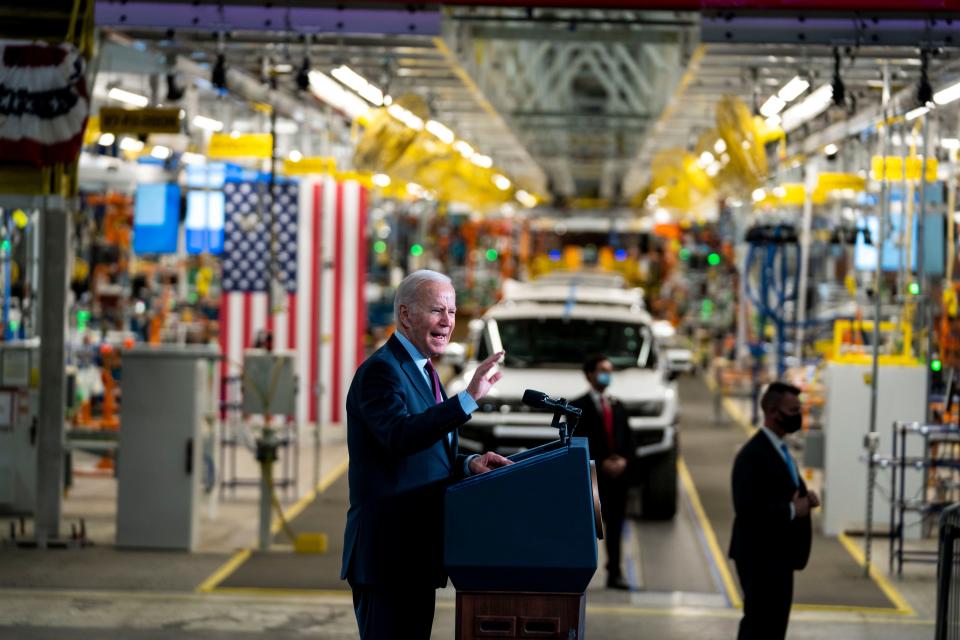Electric vehicles don't just save fuel, they bolster U.S. national security
Electrification of America’s transportation economy and infrastructure is vital to our national security.
After spending half of my Navy career on sea duty, I know, firsthand, the risks to our energy security and prosperity that come with reliance on oil and natural gas, finite resources subject to geopolitical instabilities. The U.S. Energy Information Administration estimates that more than half of the world’s daily 100 million barrel oil supply transits through seven major chokepoints in often unstable regions, particularly the Middle East.
Your Navy escorted tankers carrying international oil supplies through one of those choke points, the Strait of Hormuz, in the Tanker War of the 1980s. We have also witnessed the economic disruptions of the infamous 1973 OPEC oil embargo, the 1979 Iranian revolution energy crisis and Iraq’s occupation of Kuwaiti oil fields in 1990.

More: I test drove an EV for a week. Here's why I'm not running to the dealership just yet
Recently, Russia’s position as the principal natural gas and fossil fuel supplier to Europe prior to the invasion of Ukraine gave Vladimir Putin immense leverage over the economic welfare of Europe. It has only been through a painful and expensive process that Europe has diversified its energy portfolio – paying extraordinary premiums, locked into decades-long contracts and ultimately becoming even more dependent on Middle Eastern suppliers who can now exercise their own influence on Europe’s energy security.
In the United States, 90% of civilian and commercial transportation is still fueled by gasoline or diesel fuel, subjecting America’s economic potential to the vagaries of the volatile global oil market. The U.S. military is the largest consumer for petroleum fuels on the planet, expending up to 4.2 billion gallons each year. And the American people also see many of their tax dollars spent on our military missions protecting global oil supplies: Secure Energy for America found that to be as much as $81 billion per year in recent years. These dollars are sorely needed elsewhere in the budget to defend our country.
This is where electric vehicles and national electrification infrastructure can deliver real strategic benefits. Diversified energy resources and EVs are already beginning to reduce our dependence on unpredictable oil-exporting partners. Accordingly, EVs can reduce our exposure to energy supply shocks and, importantly, limit the risk of supply disruptions for military operations.
More: What to know about electric vehicles: 12 questions answered
Tactically, EVs are a natural fit for military applications given their advantages in lethality, logistical footprint and in reducing casualties. Simply put, the reduced thermal and acoustic signatures of EVs can help secure victory in combat while batteries and renewable energy devices will also diminish the dollar and human costs of running fuel convoys.
We’ve also seen on our nightly news the graphic consequences to the Russian military of logistical failures in Ukraine and how combat forces can be exposed as a result. This reminds us that our military also pays for fuel with blood. An Army Environmental Policy Institute study found that 52% of Army and Marine casualties over a nine-year period during Operation Iraqi Freedom and Operation Enduring Freedom were associated with defending fuel and water resupply convoys from attack.
Our military is already exploring the advantages offered by EVs, and the services will, I predict, become lucrative customers for and investors in the electrification industry. So, for our economy, energy and ultimately national security, we must and we will electrify more and more of our country.

Vice Admiral Lee F. Gunn served in the U.S. Navy for 35 years prior to his retirement in 2000. This opinion piece was originally published by The Invading Sea website, which posts news and commentary on climate change and other environmental issues affecting Florida.
This article originally appeared on Palm Beach Post: Electric vehicles bolster national security, energy independence

